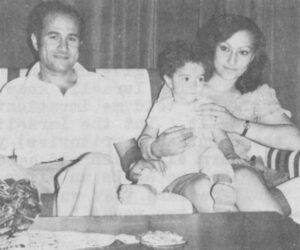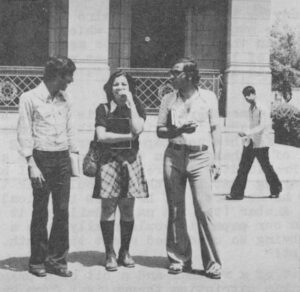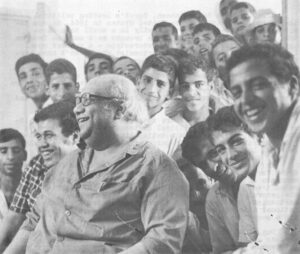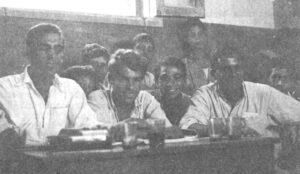These conversations took place in Cairo during the summer of 1974, but they remain just as relevant today as they were then.
Mr. Said (a pseudonym) is a highly placed, well-respected official in the Egyptian foreign ministry. He is deeply sympathetic to the Palestinian cause, both personally and politically, but is remarkably objective in his overall assessment of the Middle East conflict. He is convinced that peace cannot emerge out of a simple “deal” between the combatants, but will require a new, dynamic process through which forces on each side will strive to appreciate each other’s differences and to establish useful channels of contact with each other. The key to this process, he believes, is the future relationship between the Israelis and the Palestinians.
Mr. Said: “The first aim of Egyptian policy is to preserve our security and territory. Now look at the October war…. It was designed to end the holocaust philosophy, the mentality which believes that all the world is out to destroy every Jew. We made it clear that we were not out to destroy a non-expanding Israel. This was already clear from the Jarring memorandum in 1971. We were out to regain our lost territory.
“By kicking out the Soviets before the war, we proved that Egypt was not a client state like Israel. We dispelled illusions about our lack of technology, by giving enough training and thinking to our army. And most important, we proved that secure boundaries are those which exist between peoples who don’t feel inclined to fight.”
The Palestinian impasse
“How can these two peoples — the Palestinians and Israelis — live? The Israelis have to accept the right of the Palestinians to a national home. Israel must ease the process to help the Palestinians accept half a loaf willingly. The only way to make it palatable is to make it the start for a larger process.
“The Israelis haven’t made the first move to recognize the national rights of the Palestinians. Instead, some Israelis talk about new settlements on the West Bank based on Jewish historical claims. We can’t in the Middle Past go back to historical periods because there is no end to it. Every three feet of digging unearths a new movement.
“What is needed is to have the Israelis accept the -policy of living with a Palestinian state, to create the beginnings of a new peaceful process in which both rill have something to preserve. In the past, many opportunities were missed. The Israelis could have helped to get an agreement between the Palestinians and the Jordanians.
“The Palestinian is the modern Jew. He lives off his wits. Nobody likes him. He wants the world to be unsettled until he is settled. The Israelis have to tell the Palestinians that they have rights within the limit of national recognition of certain Israeli rights. The Israelis should say to the Palestinians, ‘Within these limits, tell us what you want.’”
Missed opportunities
“Between 1968 and 1970 if the Israelis had wanted a moderate settlement, which would have meant acceptance of and co-existence with the Arabs — they could have had it. And during this time had they given the Palestinians any significant control on the West Bank, they could have had leadership they could deal with. But instead, they gave economic opportunities while looking on the West Bank as occupied land. This created a contradiction: it is difficult to develop genuine national leadership under occupation. The Israelis could have offered to put the West Bank under United Nations occupation for two years and to keep their army out unless there was a foreign threat. But they continually resisted recognition of any Palestinian nationality and every government after 1967 dodged the question of returning the territories.
“Egypt has been called a Soviet client state BUT Egypt has not refused any American peace initiative since 1967. It is easy to work the Jews up by quoting the triple “no” (of the Khartoum Conference in 1967 which rejected negotiations with Israel) but (U.N. Security Council Resolution) 242 is never quoted, which recognizes the sovereignty of all states in the area. Khartoum was a way of reaching Arab agreement after defeat, but the ink of Khartoum wasn’t dry before Egypt accepted 242.
“The Americans weren’t serious about peace negotiations. After the 1967 defeat, Nasser said in a speech that he would accept negotiations on Sinai and the Palestinians could make their own settlement. But the international power balance favored non-settlement in the American view.
“Then changes happened. With Nasser’s death the western bogeyman was gone. Sadat has more power than Nasser ever had with no resistance, a few pockets of grumbling but nothing more, The Soviets were worried and the Arabs hopeful after Nasser’s death.”
A new historical process needed
“Peace-making is a political process. It is circular. If the Israelis condemn Maalot the Palestinians will argue that the Israelis did the same thing at Dir Yassin. You take these prejudices, added to this place and this time…well, you have to find the solution in a new political process. A nice deal where each side gives up something is only a palliative. You need a new process of viewing each other and the conflict.
“Even a generous settlement might lead to new belligerency. A dynamic peace would mean forces working for peace from within, Palestinians, Egyptians, and Israelis. It would mean that each side appreciated the other side’s differences and conducted communications with each other. This could start with trade, or deals on allocation of river waters in the Jordan Valley. With Egypt there would be contact about navigation of sea passages, and acceptance of Israel’s presence in regional organizations of the UN.
“It’s true that Sadat said his generation could not have diplomatic relations with Israel. But Israel could start this process through interaction with the Palestinians. There are many possible formulas for such contact: a canton arrangement, a bi-national state like Lebanon, or an Israeli state, a Palestinian state beside it, and perhaps rights for Palestinians living inside Israel to hold Palestinian citizenship.
“The relationship between Israel and the Palestinians is the key. If Israel and the Palestinians get along well I don’t think the rest of the Arab world will have a battle to fight. The 6th of October War has proven that a final settlement based on war is out for a long time. Either side, which pursues it, will fail. You can’t obliterate Israel by force because the world won’t allow it. But the whole process depends on continuous momentum, which depends on the Palestinians.
“Even if Sadat goes to war again it wouldn’t be for the ultimate destruction of Israel. This matter is recognized as a historical process. The Israelis have to decide whether to live on friendly terms with the Middle East. Egypt won’t tolerate an enemy on her border, which splits the Arab world geographically. Essentially Palestine is the Achilles heel of Egypt and Egypt has always tried to see that a friendly combination of nations existed there. But we can’t make a deal without the Palestinians. People here are sympathetic to the Palestinians.
“Sadat knows how to limit himself. When he deals he knows what he can give, take, deal with. The Palestinians have to come to Geneva. Then let them deal for themselves. Let them and the Israelis fight over the moon if the Palestinians ask for it. Sadat has made the yeses stronger than the nos in the Arab world, got the oil embargo lifted, got the Syrians to agree to disengagement. We stabilized the area, especially the Gulf. We have a vested interest in having spillover money from the Gulf come here rather than go into arms. We have an interest in building a new Arab world which means we can say to the Palestinians ‘let’s try it, let’s not blow it.’ The majority of the Palestinians on the West Bank want a state. Israel will develop her own way. The Arabs will develop their own way.
“If Israel can have a degree of security, the Palestinians a half a loaf of justice, and the Palestinians in Israel the right to travel freely, then the emphasis will be on self-development. Then we can have a generation, which doesn’t trust the Israelis but doesn’t see them as mortal enemies. The Israelis have very little perception of the everyday life of Egyptians. The two dreams don’t have to be contradictory. But the more contact there is with the Palestinians the better the chance for peace.
“My greatest fear is that we won’t make a peace settlement but might have a settlement without peace which leaves out the Palestinians.
“What roadblocks do I see? Slow momentum, a refusal to accept the Palestinians, a refusal to see peace as an ongoing process.”
Advice to the Israelis
“What would I tell the Israelis? First, that there is no absolute peace, only a reasonable peace. You have to accept a compromise. There are no total guarantees.
“Second, that God is not wrathful. You won’t get destroyed. Take a chance.
“Third, on the danger of future war: Sadat could not have acted on his own if the people were not ready to end the fighting. The Israelis will have to take a chance.
“Fourth, the Israelis have misread the Egyptians. Egypt has never tolerated an enemy state in the Levant. People here are very kind. There are lots of petty frictions but no hatreds. Fanaticism is rarely tolerated.
“Fifth, to the American Jews, you are not going to live in Israel so why don’t you quiet down and think about the best way to guarantee the future of those who are.”
Ahmed BahaEddin is the editor-in-chief of Egypt’s most prestigious newspaper, Al Ahram. A respected journalist and editor for many years, he has long been close to Palestinian leaders and has urged them in recent months to fight for the chance to attend the Geneva Conference when it reconvenes.
Mr. BahaEddin: “The main thing Sadat wants from the Americans is that they use their influence to solve the problem in the Middle East. I don’t think he expects to get arms. He knows it would be extremely expensive. In terms of economic aid, when he thinks of big money, he doesn’t think of the U.S. He thinks of Japan or Europe or the Arab world. There is no doubt that Arab dollars are crucial.
“It is big propaganda that the Egyptians want to go back to their own business and are not concerned with the Palestinians. As a general trend it is not true. Egyptians believe more now in the general Arab community. They think more of their friends after Israel destroyed the Canal cities and -bombed inside Egypt. Now huge numbers of Egyptians work in the Arab world. They know more. There are new economic connections: they feel cooperation with other Arabs is more important.
“I believe a majority of Egyptians feel we are responsible for the Palestinians. When the Palestinians are reasonable from the Egyptian point of view you will find this majority with them. But when the Egyptians hear that the Palestinians are not willing to stop short of all Palestinian territory then they feel bad. When the guerrillas hijack a plane and explode it at Cairo airport then the people feel the PLO is swinging against them.
“I do not believe that a West Bank state would be economically isolated. It would have its back to the Arab world. You are betting on something. Maybe a West Bank state would lead to ultimate unity with the East bank.
Egyptian territory
“It is very difficult for Egypt to make any concessions on any Egyptian territory. You can’t convince the Egyptian people that this is right. If it is a matter of international guarantees you can toy with it. To say the frontiers would be different, that would mean more war. You can make it in phases, but you can’t draw a line.
“Westerners sometimes think in terms of other wars like Germany and France. Here you are in a situation where you are giving a whole state, which was Arab to a foreign element. If the Israelis are serious about peace they should realize it can’t be done by simple treaty like with all other countries. When they talk about one treaty they are not serious.
“After the Six Days War, McGeorge Bundy carp and saw Nasser. He told me that the U.S. and Japan fought a big war after which there was a U.S. occupation, but after one year things were going smoothly. Usually people tend to make historical comparisons, which are completely different. Japan went back to being Japan, the U.S. to being the U.S.
Israeli security
“The idea of the confrontation will get out of the constitution of Arabs and Israelis if you make peace, and everybody will get used to it. This takes time. The best you can do is make an opening to a new road.
“I feel the Israelis may have changed their mind but only about how much territory they are willing to give.
“The Israeli security argument does not make sense. If Egypt has its former international borders once again, then the possibility would be slight that a future leader would come out and say he wants to start a war again. But if they have one kilometer of Egyptian land then the situation is different.
“The instability of the area was due to the wrong that was done us. The only way open to peace is to pursue the current trend, not to reverse it. Do you take it seriously that one half of the West Bank is important for security reasons? Apart from the Golan Heights, any other talk of territory for security is not serious. It is more logical to say that the Israelis are staying for religious reasons.”
Received in New York on February 5, 1975.
©1975 Trudy Rubin
Trudy Rubin is an Alicia Patterson Foundation award winner on leave from The Christian Science Monitor. This article may be published with credit to Ms. Rubin, The Christian Science Monitor, and the Alicia Patterson Foundation.







